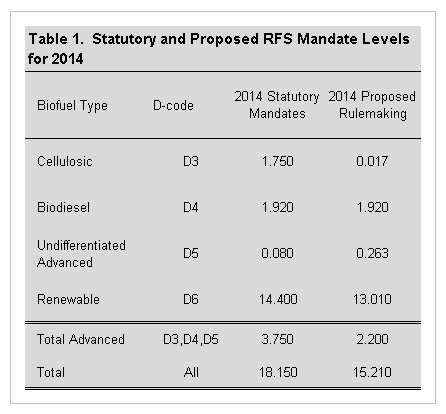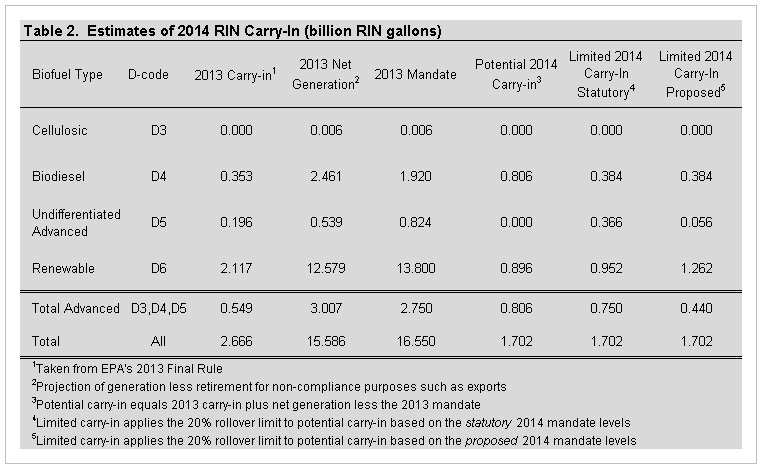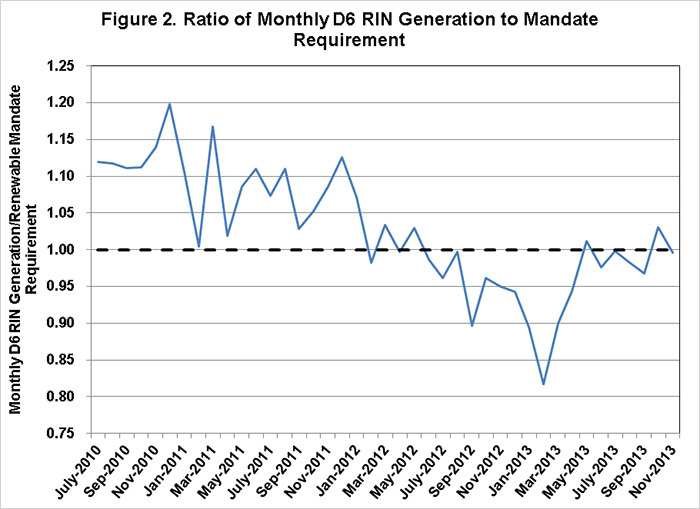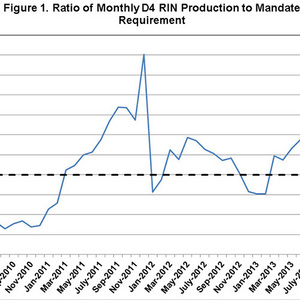Troubling advanced RIN carryover scenario under RFS proposal





Source: farmdocDaily, Department of Agricultural and Consumer Economics, University of Illinois
December 31, 2013
BY Ron Kotrba
In a recent farmdocDaily post, Nick Paulson, assistant professor in the University of Illinois Department of Agricultural and Consumer Economics, addresses renewable identification number (RIN) stocks and the implications of the U.S. EPA’s proposed 2014 volume requirements for the renewable fuel standard (RFS).
“[D4 biomass-based diesel] RIN generation has exceeded implied mandate needs for 2013 since March, following a pattern similar to that experienced under similar circumstances in 2011 as blenders provided incentives to increase biodiesel production to take advantage of a potentially expiring tax credit,” Paulson writes. “Assuming a D4 RIN generation level of 260 million gallons for December, total D4 RIN generation is estimated to exceed 2.65 billion gallons (1.77 billion biodiesel gallons) in 2013.”
Advertisement
Paulson said generation of D5 RINs peaked during the summer, averaging 70 million gallons per month from June through September. D5 RIN generation fell to 35 million gallons in October and just 23 million gallons in November. Assuming 30 million gallons are generated in December, Paulson says total D5 RIN generation for 2013 is projected at just less than 568 million gallons.
The EPA proposal suggests stalling the biodiesel mandate at 1.28 billion wet gallons, or 1.92 billion RIN gallons, and slashing the total advanced mandate from 3.75 to 2.2 billion gallons. Paulson says there’s potential for 806 million total advanced (D3, D4 and D5) RIN carryover into 2014, all of which are D4 biomass-based diesel RINs (equivalent to 537 million gallons of biodiesel). While the statutory and proposed limits for D4 RIN carryover into 2014 are both 384 million RIN gallons (256 million biodiesel gallons), he says statutory limits of total advanced rollover would be 750 million RIN gallons, meaning “56 million advanced RINs may be rolled into 2014 but would have to be demoted for use towards the renewable component of the mandate…”
Biodiesel qualifies as biomass-based diesel and advanced biofuel. Under EPA’s controversial proposed rulemaking, the total advanced carryover limit would drop to 440 million RIN gallons (293 million biodiesel gallons). “The remaining advanced RINs (366 million, equivalent to 244 million gallons of biodiesel) could be rolled into 2014 but for use towards the renewable component resulting in an estimated renewable RIN stock of 1.262 billion gallons for 2014.” This is compared to 952 million gallons of estimated renewable RIN stock under the statutory mandate levels.
Advertisement
“The EPA's reduction of the RFS biofuel mandate volumes in their proposed rulemaking for 2014 have been highly controversial,” Paulson writes. “In setting their proposed rules, EPA ignored RIN carryover explicitly stating that RIN stock levels should remain positive to allow for the flexibility the system was intended to provide. RIN carryover estimates for 2014 based on EMTS system data through November suggest that 1.7 billion gallons of RINs will be available for carryover into 2014. This is 500 million gallons more than the 1.2 billion gallon carryover level quoted in the proposed rulemaking. While the proposed reductions should not limit the total estimated RIN carryover of 1.7 billion gallons, they could impact the composition of the RIN pool carried into 2014,” Paulson concludes. “Specifically, the reduction in the advanced component could significantly limit carryover of RINs that would be eligible for advanced mandate compliance in 2014 due to the 20 percent rollover limit provision.”
For Paulson’s complete posting, click here.
Related Stories
The U.S. EPA on July 8 hosted virtual public hearing to gather input on the agency’s recently released proposed rule to set 2026 and 2027 RFS RVOs. Members of the biofuel industry were among those to offer testimony during the event.
The USDA’s Risk Management Agency is implementing multiple changes to the Camelina pilot insurance program for the 2026 and succeeding crop years. The changes will expand coverage options and provide greater flexibility for producers.
President Trump on July 4 signed the “One Big Beautiful Bill Act.” The legislation extends and updates the 45Z credit and revives a tax credit benefiting small biodiesel producers but repeals several other bioenergy-related tax incentives.
CARB on June 27 announced amendments to the state’s LCFS regulations will take effect beginning on July 1. The amended regulations were approved by the agency in November 2024, but implementation was delayed due to regulatory clarity issues.
SAF Magazine and the Commercial Aviation Alternative Fuels Initiative announced the preliminary agenda for the North American SAF Conference and Expo, being held Sept. 22-24 at the Minneapolis Convention Center in Minneapolis, Minnesota.
Upcoming Events










